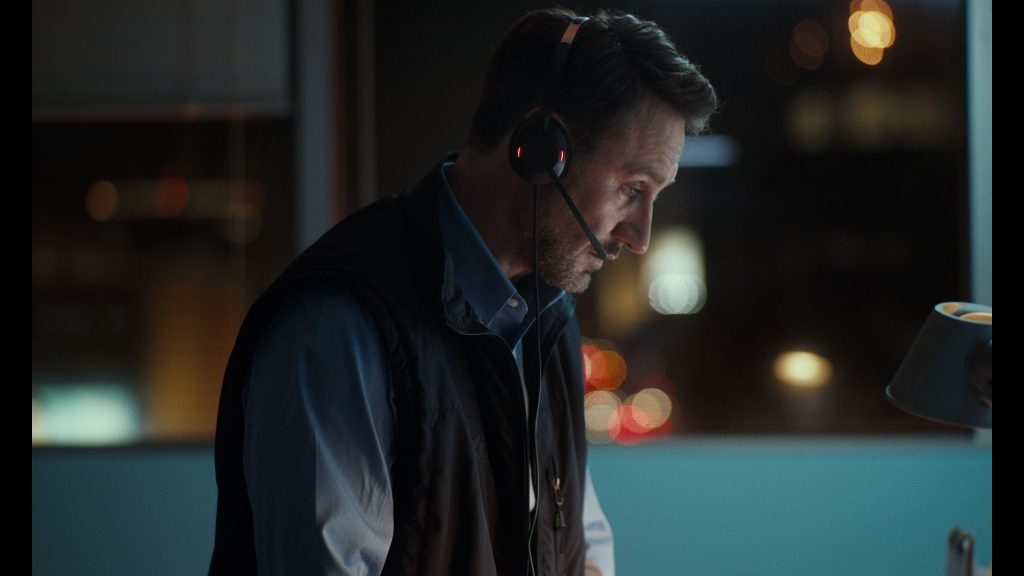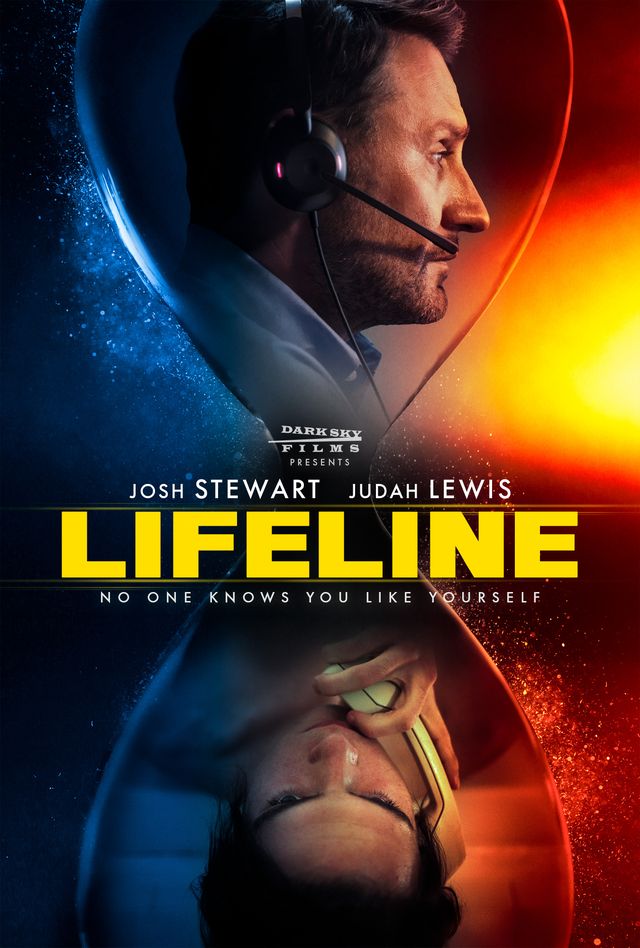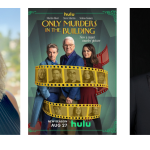Interview with Feras Alfuqaha, Director of “Lifeline”
If you got a call from your younger self – on a suicide line – how would you handle that? That’s the basic idea behind Lifeline, the new thriller from Dark Sky Films.
I had seen the trailer for Lifeline early in February, and I was fascinated, immediately adding it to my Letterboxd watchlist. (Full review will be in a separate piece.) I managed to interview Feras Alfuqaha, the director. This is his first full-length film, and I asked how it came about for him to be connected to the film.
Alfuqaha went to the American Film Institute, where he got a Masters in Fine Arts in 2016. “After that, I’ve been just working in production in different capacities, mainly as a line producer,” he explained. “During these years, I always knew I wanted direct, but I was just looking for the right material. So, it was a long journey. I read more than 1,000 treatments and more than 100 scripts to find Lifeline. And then, once I found [it], I started working with the writer and convinced him. It was just like a lot of reading, going through scripts and ideas until I found our story that felt like it has an original voice and something unique that I haven’t seen before.”
IMDb has the movie classified as a thriller, but the trailer has some elements of horror in it as well. I asked if Alfuqaha had a preference for that genre or if it just was a coincidence. “I think for this specific story, I was careful in working with the writers to make sure that we have this entertaining, thrilling story at the surface level,” he said. “I just made sure that working on [the] development of the script to make sure we have the dramatic depth. I always wanted to have layers for the script.”
When it comes to his preferred genre, however, he’s quick to add a disclaimer. “Honestly, I wouldn’t say, ‘Oh, this is the only thing I would do—only horror or only thrillers—but, I would say probably a mix of a thriller, a drama, or maybe some action. Also, if I find the right story, I would be open to it. So yeah, probably just a mix of genres.”
While Alfuqaha has been wanting to direct for a while, there’s also a difference between what you think a job is going to be like and the reality. I asked him how the experience compared to what he was expecting.
“I wasn’t surprised,” he answered. “And the reason with that is not like, ‘Oh, I knew it,’: it’s just because I think I worked with a lot of directors before, and I was observing them and trying to learn from everyone I was surrounded by. And I think that kind of prepped me to have my expectations, like on Earth and in reality. I’m not expecting the moon while the reality is something different. So I think just like observing and working with different productions, seeing what works with the director, see what doesn’t work, see when things go wrong, how to deal with it, and how to really be flexible and be able to make decisions on the fly to save the scene or save the day but still having story and the film at the like at the middle of your decision.”
Since it was Alfuqaha’s first time directing, I asked what the hardest/least favorite part of the experience was for him. “I would say trying to make decisions and move forward fast while you have limited resources,” he responded. “Being primarily in one location, that was, honestly, a great choice on the writer. That made the production very feasible with limited resources. At the same time, it required a lot of creativity, working with the cinematographer to make sure that every shot is entertaining and makes sense for the story, working with the art team so it just requires something different to come. But it was a fun journey, honestly, surrounded by a creative team of hard-working people.”

As for the easiest/favorite part?
“Being surrounded by a talented team,” Alfuqaha said. “Working with the cast, as my first movie to direct, I think I was super lucky. They’re extremely talented. I mean, working with Josh Stewart as Stephen Thomas in this movie: he was exceptional. We had a few discussions pre-production about the character, and that enabled us to be really in sync. It was a very easy, very smooth process. I mean, his ability to get in character on cue is unmatched, so seeing that on set with all the pressure and his performance, that’s just a joy to watch.”
I’m always interested in how people decide to do the job they do, and so I asked Alfuqaha if he had always known he wanted to be in film. “I think I wanted to do something that has to do with creativity,” he said. “So I did my undergrad in animation. For me, that was like a field that combines the creativity with some technical aspect, which I always enjoyed. But then by the end of my studies, I realized, I need to understand the business side: how to actually make a movie, how to make a budget, how to run a studio. So I think that what like made me [think] I have to go to AFI for producing. Also, going to AFI, I think that’s just opened my eyes and exposed me to the industry, especially in live action, and I’ve been working in it since then. So, I think the route that led me to that, I wanted to be creative in the creative field. But did I know I wanted to be exactly a director when I was 16 years old? Probably not,” he finished with a laugh.
Along those same lines, I asked Alfuqaha about the time he realized this was something he could do for a living. “I grew up in Kuwait in the Middle East, and I didn’t know anyone who was a director,” he said. “This field is not… I’m not surrounded by people in this field. So for me, that was just a dream. That’s something that’s far away. But as I’m getting older, I don’t see a lot of directors from the Middle East making big movies. And I think that’s what kind of initiated the first curiosity. That being said, you know how difficult it is. I get a lot of questions from people asking, ‘I want to be a director or producer, a writer.’ And my first note: it’s not as glamorous as it looks or as it sounds. Being at one of the top schools also gave me a really deep understanding of the industry.”
Since he mentioned it, I next asked him what kind of advice he would give someone wanting to get into the industry.
“I think usually my first note is just—you need to understand it for what it is,” Alfuqaha shared. “And right after that is like, what exactly do you want to do or be? A director, a producer, a writer? If you’re expecting to graduate or just start working and someone or a company or a student is going to come to you and tell you, ‘Here’s an opportunity, here’s a few million dollars, go make your first film.’ This is not going to happen. You have to find your story. You have to find a way to make it. No one’s going to help you to make especially the first one or maybe the first two. Hopefully, you make one or two good films, and then people will call you a writer or a director or producer. No one’s going to call you like that because you have a degree in that, regardless of what institution you come from. So usually my advice is like just making sure they understand the reality of it, because you can always inspire people. So at least they’re not surprised by it after a few years of trying to make a film, a movie, or whatever it is.”
Considering the premise of Lifeline, I of course had to ask Alfuqaha what he would say to his younger self if he could talk to him. “Always take longer than expected,” he said with a laugh. “I understand the reality and everything and having grounded expectations, but there’s always something’s going to come up and different things that you don’t expect. The thing I always think about is [that] you have to do the work; you have to do a lot of work and a lot of preparation. So when things arise and things like come up, you have to adjust to it. At least you’re prepared to take these decisions. If you’re not prepared or you’re still behind on your work and then things go wrong or unexpected things happen, whether it’s locations or cast or whatever it is, you won’t be able to deal with it. And I think I learned that from producing, and I took the I took these skills to that direction side, and I think it helped me in a big way.”
I asked him what was next on his plate, but of course, it being Hollywood, he couldn’t tell me much. He just finished developing a script with a writer for a feature film.
So when it comes down to it, why is Alfuqaha in the industry? What does Hollywood and movies mean for him?
I go back to the way I found Lifeline. I’m looking for something that’s entertaining, but also has a message, has a depth in it. And I think that kind of inspires me and keeps me going. I want to make something that people enjoy and would love to watch and be entertained. Right? But at the same time, it has value. It has a message where there’s a social message. For Lifeline, I’m not going to give it away, but there’s a deeper message as you watch it. By the end, there’s a few things I would like the audience to think about and question and leave thinking about a few things. So I think that’s kind of the type of movies I enjoy and I would like to make: not just an entertaining, fun film—which like, nothing wrong about that you can enjoy that Friday night movie, but I think that’s kind of what inspires me and keep me going. I’m looking for the next question. What’s the message we’re trying to say? What’s the entertaining element in that?”
Lifeline was released on February 21, 2025, and is available on digital and in theatres.
More information about the film can be found here.
Author: Angie Fiedler Sutton
Angie Fiedler Sutton is a writer, podcaster, and all-round fangirl geek. She has been published in Den of Geek, Stage Directions, LA Weekly, The Mary Sue, and others.
She also produces her own podcast, Contents May Vary, where she interviews geeky people about geeky things. You can see all her work (and social media channels) at angiefsutton.com.
Help support independent journalism. Subscribe to our Patreon.
Copyright © The Geekiary
Do not copy our content in whole to other websites. If you are reading this anywhere besides TheGeekiary.com, it has been stolen.Read our







